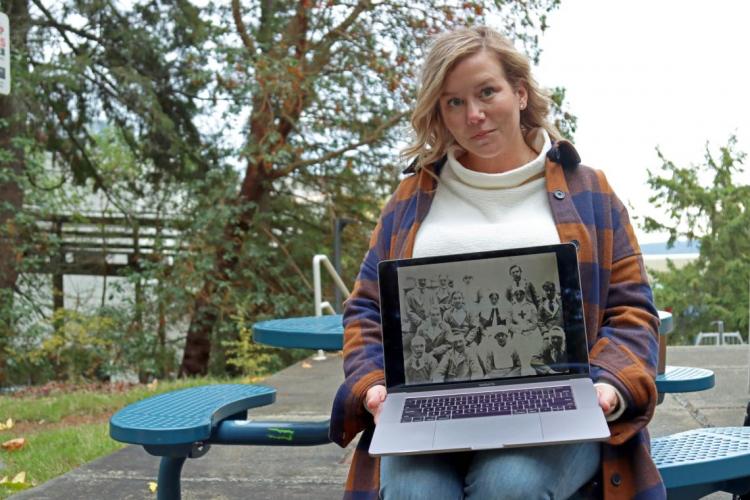
VIU Education student Danielle Cossey-Sutton's research sought to understand and recognize the role of women during the war, both at home and on the frontlines.
Danielle Cossey-Sutton's project was funded by a Mitacs Research Training Award.
A gap in First World War research is how women experienced trauma. Vancouver Island University (VIU) Bachelor of Education student Danielle Cossey-Sutton spent part of the last academic year investigating this aspect of history.
"Historical scholars admit it is difficult to explore gender studies during the First World War since many women didn't speak of the war once it ended and/or they returned home," says Cossey-Sutton. "During and post-First World War, women were often forgotten about in discussions about their trauma and their experiences of war. This made my paper more difficult to write, but also, and most importantly, that much more important to write about. I ended up focusing my thesis around using letter writing as a window into understanding psychological and physical trauma and war."
With financial support from a Mitacs Research Training Award, and matching funds from the Heritage Management Centre, a primary part of Cossey-Sutton's research, which she completed in April 2021, was surveying resources from the Canadian Letters and Images Project (CLIP) and developing her own research questions relating to women and trauma during the First World War.
"The result was an impressive piece of original historical research - something that we might typically expect to see at the graduate level," says Dr. Whitney Wood, Canada Research Chair in the Historical Dimensions of Women's Health and a VIU History Professor, who co-supervised Cossey-Sutton's research. "Mitacs awards offer students valuable opportunities to gain experience in hands-on research, and for students in the humanities, these opportunities can be few and far between."
Cossey-Sutton sought to understand and recognize the role of women during the war, both at home and on the frontlines, and the gender experience through connection and communication during wartime. Her research revealed that the traumatic experiences of female workers, both as nurses and nursing aids, were overlooked because they were not soldiers.
"Women on the frontlines danced intimately with the line of war, where they experienced physical, emotional and sexual traumas every day, yet were dismissed by male doctors," she shares.
Throughout her project, Cossey-Sutton remained true to her goal of consulting CLIP as much as possible, considering it an integral part of her research and project.
"CLIP provided the opportunity to hear the voice of women in a time where women weren't really part of society outside the home," she says. "The letters provided an intimate look into the world during 1914-1918 and gave me an opportunity to see women, some younger than I am, as human beings who happened to live during wartime."
One thing that Cossey-Sutton observed was how the need for human connection is no different than our needs today.
"Society has learned, especially during the pandemic, how important it is to remain connected to our families and friends," she says. "Life didn't stop during wartime; it was simply reinvented. People used letter writing to make sense of their experiences; they wrote to each other to work through their traumatic experiences and maintain relationships outside of the war. Like today's texting and emails, there is an intimacy with writing. Writing provided an outlet of normalcy and ensured that relationships were protected and preserved."
Dr. Stephen Davies, Project Director of CLIP, who co-supervised her research, says Cossey-Sutton did a remarkable job putting together a complex research project such as this.
"The depth of research, and the organization and analysis of that research to create a final paper, was one of the best examples of undergraduate research that I have seen," he says. "While the letters of CLIP have been used to examine numerous aspects of the Canadian wartime experience, they have never been used to look specifically at the female experience. I was impressed with what Danielle was able to pull from the collections, not simply from female letters but also the letters of soldiers."
Cossey-Sutton believes that understanding the effects of trauma, mental illness and addiction gives not only historians, but also educators, psychologists, sociologists and political scientists the opportunity to engage with humanity on an entirely new level.
"Humanity is messy and complicated and to move forward and be better, we must address the past and learn how we can support the future," she says.
Cossey-Sutton presented at the 2021 VIU CREATE conference last April, winning three awards. She was also part of the CREATE: STARs - Short Talks About Research, which involved presenting to high school students about the research opportunities VIU offers.
"Danielle is a thorough, thoughtful and motivated student, and one of the most impressive undergraduate researchers I've encountered at VIU," says Wood. "I'm looking forward to continuing to work with her to publish her findings. I can't wait to see what she does next."










